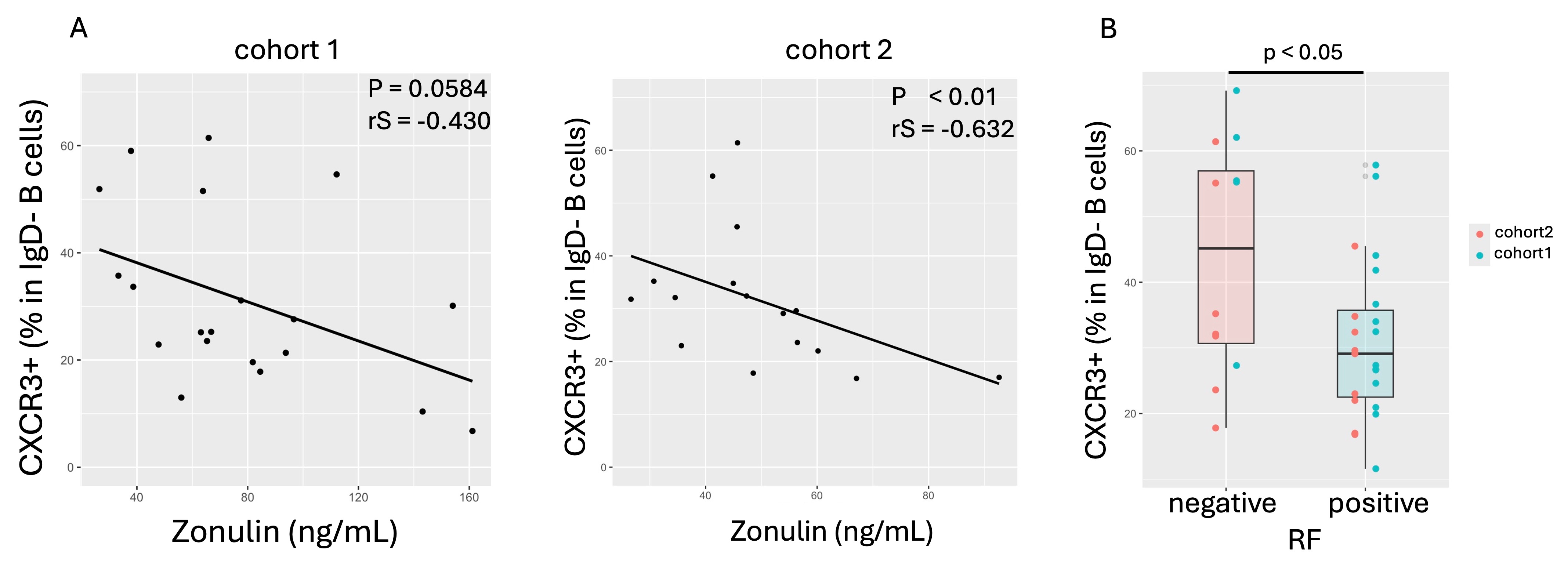Session Information
Date: Monday, October 27, 2025
Title: Abstracts: B Cell Biology & Targets in Autoimmune & Inflammatory Disease (1691–1697)
Session Type: Abstract Session
Session Time: 3:00PM-3:15PM
Background/Purpose: It has been proposed that the mucosal environment is associated with the pathogenesis of rheumatoid arthritis (RA). In addition to gut dysbiosis, intestinal barrier dysfunction has been reported prior to disease onset and may potentiate immune activation but has not been well-studied in relation to B cell dysregulation. Here we examined serum zonulin as a read-out of gut permeability and its relationship with autoantibodies and B cell subsets in RA to decipher the impact of increased gut permeability on autoimmunity.
Methods: Cohort 1 were composed of 20 RA patients (85% positive for either rheumatoid factor (RF) or anti-CCP antibodies (CCP)) and 16 age-matched healthy controls (HC). Cohort 2 comprised 22 RA patients with a higher seronegative fraction (40%) in order to examine the impact of autoantibody status. Serum zonulin levels were measured by zonulin ELISA kit (Immundiagnostik AG), serum IgA-RF titer was measured by ELISA kit (Abonova), and flow cytometry was conducted to characterize B cell subsets. In CD19+ IgD- antigen-experienced B cells, Age-associated B cells (ABCs) were defined as CD11c+ and CXCR5-, and the expression of CXCR3 was determined using isotype control. RF+ B cells were detected using biotinylated IgG-Fc fragment followed by streptavidin – BV605 in peripheral blood samples (n=6). Flow cytometry was also conducted on synovial fluid samples from RA patients (n = 7) to characterize ABCs.
Results: Serum zonulin levels were significantly elevated in RA compared to HC (cohort 1) and higher in RF+ RA patients (cohort 2) (Figure 1A), while there was no statistically significant difference between CCP+ and CCP- patients. Moreover, both IgM and IgA-RF titers were significantly correlated with zonulin levels (Figure 1B). In IgD- B cells, CXCR3 was more highly expressed in ABCs than other B cells. CXCR3 expression in IgD- B cells was inversely correlated with zonulin levels in both cohorts (Figure 2A). Moreover, CXCR3 expression in IgD- B cells was significantly lower in RF+ patients (Figure 2B). Of note, there was no significant difference of the frequencies of ABC between HC and RA, and the frequencies of ABC were associated with neither RF positivity nor zonulin.RF+ B cells were detected in the peripheral samples (Figure 3A). In IgD- B cells, RF+ B cells were enriched in the CXCR3+ CD11c+ subset (Figure 3B and C). Out of two synovial fluid samples on which RF+ B cells were investigated, RF+ B cells were detected (0.56% in total B cells) in one sample. In this sample, RF+ B cells were also enriched in CD11c+ CXCR3+ subset. Overall, in the synovial samples, majority of B cells were IgD-, and ABCs were more expanded than peripheral blood (Figure 3D and E).
Conclusion: Increased gut permeability was associated with the presence of RF. Serum zonulin was inversely correlated with circulating CXCR3+ B cells, and RF+ B cells were enriched in CXCR3+ CD11c+ B cells. We hypothesize that pathological B cells including ABCs may migrate to the joint via a CXCR3 – CXCL9/10 axis in the setting of increased gut permeability resulting in the decrease in CXCR3+ B cells in the circulation. Our ongoing research investigates how the migratory process of B cells is influenced by gut factors as well as how this affects the clinical outcome.
 A. Serum zonulin levels. The Mann-Whitney U test was done in both cohorts. B. The correlation analysis between serum zonulin and IgA-RF titer.The Spearman’s correlation test was done.
A. Serum zonulin levels. The Mann-Whitney U test was done in both cohorts. B. The correlation analysis between serum zonulin and IgA-RF titer.The Spearman’s correlation test was done.
.jpg) A. Correlation between serum zonulin levels and expression of CXCR3 in IgD- B cells in both cohort 1 and 2. The Spearman’s correlation test was done. B. Comparison of the expression of CXCR3 in IgD- B cells between RF- RA (n=12) vs RF+ RA (n=23). The Mann-Whiney U test was done.
A. Correlation between serum zonulin levels and expression of CXCR3 in IgD- B cells in both cohort 1 and 2. The Spearman’s correlation test was done. B. Comparison of the expression of CXCR3 in IgD- B cells between RF- RA (n=12) vs RF+ RA (n=23). The Mann-Whiney U test was done.
.jpg) A. The gating of RF+ B cells using blank control (only SA-BV605 was added). B. The distribution of RF+ B cells in terms of CD11c and CXCR3 expression. C. The analysis of enrichment of RF+ B cells in each subset in RA (n=6). Enrichment ratio = (% in RF+ IgD- B cells / % in CD19+ IgD- B cells). Kruskal-Wallis test was done. D and E Comparison of each subset between unpaired peripheral and synovial samples.
A. The gating of RF+ B cells using blank control (only SA-BV605 was added). B. The distribution of RF+ B cells in terms of CD11c and CXCR3 expression. C. The analysis of enrichment of RF+ B cells in each subset in RA (n=6). Enrichment ratio = (% in RF+ IgD- B cells / % in CD19+ IgD- B cells). Kruskal-Wallis test was done. D and E Comparison of each subset between unpaired peripheral and synovial samples.
To cite this abstract in AMA style:
Yasaka K, Pellett N, Krenitsky D, Anolik J. Rheumatoid factor is associated with increased gut permeability and migration of B cells to the joint via CXCR3 in rheumatoid arthritis [abstract]. Arthritis Rheumatol. 2025; 77 (suppl 9). https://acrabstracts.org/abstract/rheumatoid-factor-is-associated-with-increased-gut-permeability-and-migration-of-b-cells-to-the-joint-via-cxcr3-in-rheumatoid-arthritis/. Accessed .« Back to ACR Convergence 2025
ACR Meeting Abstracts - https://acrabstracts.org/abstract/rheumatoid-factor-is-associated-with-increased-gut-permeability-and-migration-of-b-cells-to-the-joint-via-cxcr3-in-rheumatoid-arthritis/
